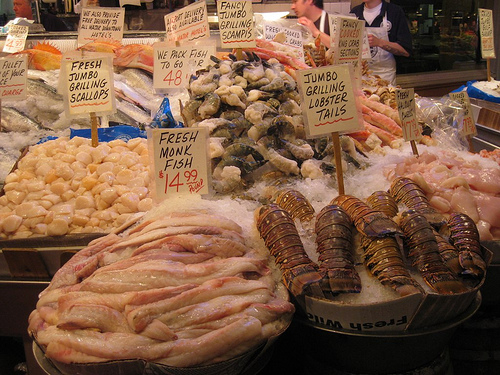
One of the world’s most famous fish markets, Pike Place in Seattle Washington.
(Photo by Flickr user yoohoojuju used under Creative Commons Attribution license.)
What’s the first thing that pops in your mind when thinking about why you should eat seafood? I bet it’s Omega-3 fatty acids. These special fats are “essential” for good health, meaning we must get them from our diet because our bodies cannot make them. Seafood happens to be the best source of these special fats because they contain larger amounts and are better utilized in the body than other sources.
Omega-3 Fatty Acids
Your brain and eyes are the body’s biggest users of Omega-3’s. Omega-3’s are part of your cells’ outer covering and are used as signals in the body for certain processes, including blood clotting. Omega-3’s are anti-inflammatory, which helps protect your body from stress and damage. They also may help prevent chronic diseases, particularly heart disease, as well as diabetes, cancer and Alzheimer’s. Other benefits linked with Omega-3’s include protection against depression and damage from autoimmune diseases like rheumatoid arthritis and lupus.
In fact, Omega-3’s are so good for you, I don’t have enough room in this post to talk about them all. Bottom line- Omega-3’s are essential for good health.
Seafood Nutrition
Seafood is also valuable for less exciting reasons, too. Seafood is a healthy source of easily digested protein and many types of seafood are low in fat, saturated fat and cholesterol. However, the seafood that is higher in fat is higher in Omega-3’s, so we should eat those types often as well. Crustaceans (shrimp, lobster and crab) tend to be higher in cholesterol, so save these as special treats, not your main seafood choices. Seafood is also a good source of many vitamins and minerals, too. Eggs are sometimes called the perfect food, but I like to think that seafood may be even more perfect!
Recommendations for Eating Seafood
For these reasons, experts recommend eating a variety of seafood twice a week. Doing so will help you get enough of those wonderful Omega-3’s as well as limit your exposure to toxic chemicals, like mercury, that some seafood contains.
In general, smaller fish, like anchovies, sardines or tilapia, are lower in these harmful chemicals. People at high-risk for harm from these chemicals (pregnant or nursing women and young children) should avoid fish highest in these chemicals:
- Shark
- Swordfish
- Tilefish
- King Mackerel
The good news is the most popular fish eaten in America are also low in harmful chemicals. Seafood cooks very quickly, so it’s a great option for a fast dinner. Just remember, deep-frying fish (like fish and chips or fish sticks) adds unnecessary calories and fat to an otherwise very healthy food.
Personally, I love any and all seafood. One of my go-to packed lunches is a salad topped with sardines canned in mustard sauce. It adds a hearty serving of protein (which helps keep you satisfied longer), a mega-dose of health promoting Omega-3’s and a unique twist on a boring garden salad. I am also a fan of anchovies on pizza, which most people either love or hate.
What types of seafood do you like? What’s your favorite way to prepare it?
